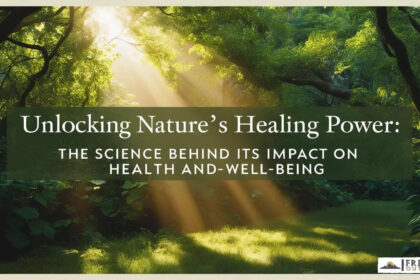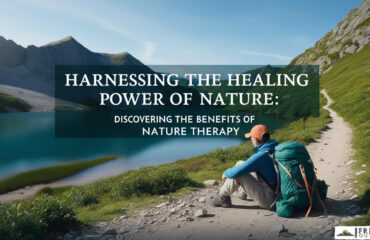
Discover the scientific benefits of natures healing effects on mental and physical health, from stress relief to enhanced well-being.
Introduction: Understanding Nature’s Healing Effects
Nature exposure is intricately linked to numerous mental and physical health benefits, firmly establishing itself as an essential component of overall well-being in the contemporary world. Scientific studies underscore the profound impact that being in natural environments has on both psychological and physiological health, revealing the intricate relationship between nature and our health. The COVID-19 pandemic prompted many individuals to spend more time outdoors, which brought to light the therapeutic benefits of nature for stress relief and mental clarity. This article delves into the scientific understanding of nature’s healing effects, focusing on how it promotes holistic health and enhances our quality of life.
The increasing recognition of nature’s importance is backed by a multitude of studies demonstrating its positive effects on well-being. For instance, Dr. Hass from Alta Bates Summit Medical Center has shared compelling patient experiences where outdoor activities significantly improved mental health outcomes. A notable case involves a patient who was prescribed time outdoors to enjoy sunsets and natural scenery, which resulted in noticeable improvements in their mood and overall mental state. Such anecdotes emphasize the need for a more nature-centric approach to health care, suggesting that integrating nature into our lives can be as beneficial as traditional medical interventions.
The Connection Between Nature and Mental Health
Research has consistently shown that exposure to nature correlates with improved mood and reduced stress levels, illustrating its critical role in mental health. A large-scale study revealed that individuals who spend at least 120 minutes per week in green spaces report enhanced psychological well-being, significantly outpacing those who do not engage with nature regularly. This threshold is essential, as the study found that no benefits were observed for those who spent less time outdoors. For example, people who frequently visit local parks or nature reserves often report feeling happier and less anxious, highlighting the direct connection between nature and mental health.
Moreover, nature-based interventions have proven effective in therapeutic settings for treating anxiety and depression. These interventions leverage the calming effects of natural environments to help individuals cope with psychological stressors, providing a unique avenue for healing that often complements traditional therapies. Research indicates that spending time in nature can also mitigate the psychological impacts of climate change, offering a means to reconnect with the environment and alleviate feelings of helplessness and anxiety associated with global issues. For instance, programs that encourage nature walks or community gardening have shown promise in improving mental health outcomes for participants, creating a supportive atmosphere for healing and growth.
Benefits of Forest Bathing
Forest bathing, or “shinrin-yoku,” is a practice that originated in Japan and has gained global recognition for its numerous health benefits. Studies have indicated that spending time in forests is linked to lower stress levels and improved immune function, making it a valuable practice for enhancing overall health. In Japan, nearly 100 designated forest bathing locations have been established, emphasizing the cultural significance and health benefits associated with this immersive experience. Participants often report experiencing higher levels of vitality and lower tension after engaging in forest bathing, which underscores its therapeutic potential.
The benefits of forest bathing extend beyond immediate stress reduction. Exposure to forest aerosols during these experiences may enhance the immune response, contributing to overall health and well-being. Research has shown that forest bathing can lower cortisol levels, a hormone associated with stress, further reinforcing its therapeutic effects. For instance, individuals who regularly participate in forest bathing report not only reduced stress but also improvements in mood, sleep quality, and cognitive function, illustrating how deeply nature can influence our mental landscape. This practice serves as a reminder of the healing power of nature, encouraging individuals to step away from the hustle of daily life and immerse themselves in the tranquility of the natural world.
The Role of Green Spaces in Urban Areas
Urban areas frequently face challenges such as “park deserts,” which limit access to nature and negatively impact public health. The lack of green spaces in cities poses a significant barrier to accessing the mental and physical health benefits that nature provides, emphasizing the need for strategic urban planning. Access to green spaces is essential for health equity, particularly for economically disadvantaged communities that often experience higher levels of stress and poorer health outcomes. Organizations like Park RX America advocate for nature prescriptions as a means of addressing chronic diseases and promoting well-being among urban populations. For instance, community gardening projects can provide not only fresh produce but also a sense of belonging and purpose, fostering connections among residents.
Enhancing green spaces in cities has been shown to lead to lower crime rates and improved community cohesion. Urban parks serve as vital areas for physical activity, social interaction, and mental restoration. For example, cities that have invested in creating more accessible parks have observed a decline in crime rates and an increase in community engagement, demonstrating the multifaceted benefits of nature in urban environments. By integrating more nature into urban planning, cities can foster healthier communities and improve the overall quality of life for their residents. Initiatives aimed at transforming vacant lots into green spaces or creating rooftop gardens illustrate the potential for urban innovation to enhance community health through nature.
The Science Behind Attention Restoration Theory
Attention Restoration Theory posits that nature helps the brain recover from mental fatigue by requiring less cognitive effort than urban environments. Engaging with natural surroundings promotes relaxation and mental restoration, making it easier for individuals to focus and be productive. Research indicates that even short exposures—just 40 seconds of viewing nature—can significantly improve performance on attention-draining tasks, highlighting nature’s ability to refresh our cognitive resources. For instance, students who take brief breaks to engage with nature during study sessions often demonstrate increased focus and better retention of information.
This theory also suggests that nature can enhance creative problem-solving abilities. Individuals who spend time in natural settings may find it easier to think outside the box and generate innovative solutions to challenges. A notable study found that participants who spent time in nature before engaging in creative tasks produced more original ideas than those who remained in urban settings. This cognitive boost reinforces the notion that integrating nature into work environments can lead to increased focus and productivity, making it a valuable asset for organizations seeking to enhance employee performance. By recognizing the contributions of nature to cognitive function, workplaces can promote policies that encourage outdoor breaks and the integration of natural elements into office design.
The Physiological Benefits of Nature
Nature exposure has been associated with lower blood pressure and enhanced immune function, showcasing its profound impact on physiological health. Studies indicate that patients in hospitals with views of nature tend to heal faster than those without such exposure, illustrating the restorative power of natural environments. The presence of greenery has been linked to shorter recovery times and reduced pain levels, making nature a crucial factor in healthcare settings. Moreover, time spent in nature has been shown to significantly reduce symptoms of Attention Deficit Disorder and aggression, particularly in children. For example, children who engage with nature regularly exhibit better physical health and lower obesity rates, emphasizing the role of outdoor play in promoting a healthy lifestyle.
Nature can also improve cardiovascular health by reducing heart rate and promoting relaxation. Research has demonstrated that individuals who spend time in natural settings experience lower levels of stress and a reduction in physiological markers associated with chronic stress, such as elevated cortisol levels. These findings suggest that regular engagement with nature can lead to significant improvements in overall health. For instance, outdoor activities like hiking, biking, or simply walking in a park not only enhance physical fitness but also contribute to better mental health outcomes, creating a holistic approach to wellness. Such evidence underscores the importance of promoting outdoor experiences as a means to bolster physical health and well-being.
Emotional and Social Benefits of Nature
Engaging with nature fosters prosocial behavior and enhances social interactions. Individuals who spend time outdoors report feeling happier and more fulfilled, experiencing a heightened sense of purpose in their lives. Activities such as gardening not only improve mental health but also strengthen community ties and reduce feelings of isolation. Community gardening initiatives, for instance, can bring people together, fostering social cohesion and a sense of belonging. These activities provide opportunities for collaboration, allowing individuals to work towards a common goal while enjoying the benefits of nature.
Additionally, spending time in natural environments can enhance empathy among individuals, promoting a greater sense of community. Engaging with nature-based social activities encourages collaboration and connection, reinforcing the idea that nature serves as a catalyst for improved social well-being. For example, programs that organize group hikes or outdoor events often lead to the development of lasting friendships and support networks among participants. This sense of community is crucial, especially in urban environments where social isolation can be prevalent. The emotional and social benefits derived from nature underscore its importance in fostering not just individual well-being but also community health.
Addressing Health Disparities with Nature
The importance of green spaces for community well-being has been emphasized by the Johns Hopkins Center for Health Equity, which highlights initiatives aimed at improving access to nature. Limited access to natural environments is often linked to increased stress levels and poorer health outcomes in lower-income neighborhoods, underscoring the need for equitable access to green spaces. For instance, programs designed to increase green space access have shown promise in leading to improved health outcomes and reduced healthcare costs for these communities. The implementation of community gardens or the revitalization of local parks can create significant opportunities for health improvement in underserved areas.
Engaging marginalized communities in nature-based activities can enhance their overall health and well-being, creating pathways for equity in health outcomes. By prioritizing access to nature, policymakers can address health disparities and promote a healthier society. Initiatives that involve local residents in the planning and maintenance of green spaces can foster a sense of ownership and responsibility, further enhancing community engagement. For example, urban farms or community-led green projects not only provide fresh produce but also serve as platforms for education and empowerment, illustrating how nature can play a pivotal role in addressing social disparities.
Practical Tips for Incorporating Nature into Daily Life
Incorporating nature into daily routines can significantly enhance mental health and well-being. Scheduling regular “nature breaks” of at least 10 minutes can help boost mood and reduce stress levels, making even brief encounters with nature beneficial. Engaging in outdoor workouts or “green exercise” provides additional cognitive benefits, as physical activity in a natural setting can improve mood and motivation. For instance, individuals who participate in outdoor yoga classes often report feeling more connected to their surroundings and experience heightened relaxation.
Participating in community wellness events, such as yoga in parks, can also foster connections with nature and others, creating a sense of community while promoting health. Moreover, creating a nature-friendly home environment by adding plants or nature-themed decor can help reduce stress and improve overall mood. For example, incorporating indoor plants not only enhances aesthetic appeal but also purifies the air, contributing to a healthier living space. Planning nature outings with friends or family further promotes social interaction and encourages a shared appreciation for the outdoors, strengthening relationships while enjoying the benefits of nature. By actively seeking ways to integrate nature into daily life, individuals can cultivate a lifestyle that prioritizes mental and physical health.
Conclusion: The Importance of Nature for Holistic Health
Engaging with nature is essential for mental and physical well-being, particularly in today’s fast-paced society. The growing recognition among policymakers of the need to integrate natural spaces into urban planning highlights the potential for improving public health outcomes. A commitment to enhancing access to nature can lead to significant benefits for individuals and communities alike. By prioritizing green spaces and fostering connections to nature, we can cultivate healthier, more resilient populations. Future research should continue exploring the long-term benefits of nature exposure across diverse populations, further solidifying the importance of nature in promoting holistic health.




